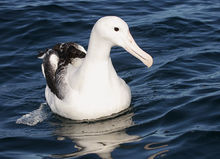List of fully endemic species
These species (and subspecies) are found only in New Zealand. They are listed in alphabetical order by common name, with an indicator of their conservation status.

- Antipodes Island parakeet, Cyanoramphus unicolorVU
- Antipodes snipe, Coenocorypha aucklandica meinertzhagenae
- Auckland Island merganser, Mergus australisEX
- Auckland Island shag, Leucocarbo colensoiVU
- Auckland rail, Lewinia muelleriVU
- Auckland teal, Anas aucklandicaVU
- Bellbird (korimako), Anthornis melanuraLC
- Black robin, Petroica traversiEN
- Black stilt (kakī), Himantopus novaezelandiaeCR
- Black-billed gull (tarāpuka), Chroicocephalus bulleriEN
- Black-fronted tern (tarapirohe), Chlidonias albostriatusEN
- Blue duck (whio), Hymenolaimus malacorhynchosEN
- Bounty Island shag, Leucocarbo ranfurlyiVU
- Brown creeper (pipipi), Mohoua novaeseelandiaeLC
- Brown teal (pāteke), Anas chlorotisEN
- Bushwren (mātuhituhi), Xenicus longipesEX
- Campbell Island shag, Leucocarbo campbelliVU
- Campbell snipe, Coenocorypha aucklandica perseverance
- Campbell teal, Anas nesiotisEN
- Chatham Island bellbird, Anthornis melanocephalaEX
- Chatham Island fernbird, Megalurus rufescensEX
- Chatham island oystercatcher (tōrea tai), Haematopus chathamensisEN
- Chatham Island pigeon (parea), Hemiphaga chathamensisVU
- Chatham Island rail, Cabalus modestusEX
- Chatham Island shag, Leucocarbo onslowiCR
- Chatham Island snipe, Coenocorypha pusillaVU
- Chatham Island warbler (riroriro), Gerygone albofrontataLC
- Chatham parakeet (Forbes' parakeet), Cyanoramphus forbesiEN
- Dieffenbach's rail (moeriki), Gallirallus dieffenbachiiEX
- Fernbird (matata), Megalurus punctatusLC
- Fiordland crested penguin (tawaki), Eudyptes pachyrhynchusVU
- Foveaux shag (kawau), Leucocarbo stewartiVU
- Great spotted kiwi (roa), Apteryx haastiiVU
- Grey warbler (riroriro), Gerygone igataLC
- Hawkin's rail (mehonui), Diaphorapteryx hawkinsiEX
- Hodgens' waterhen, Gallinula hodgenorumEX
- Huia, Heteralocha acutirostrisEX
- Kākāpō, Strigops habroptilusCR
- Kea, Nestor notabilisEN
- King shag (kawau), Leucocarbo carunculatusVU
- Laughing owl (whēkau), Sceloglaux albifaciesEX
- Little spotted kiwi (kiwi pukupuku), Apteryx oweniiNT
- Long-tailed cuckoo (koekoea), Urodynamis taitensisNT
- Lyall's wren (Stephens Island wren), Traversia lyalliEX
- Malherbe's parakeet (orange-fronted parakeet) (kākāriki karaka), Cyanoramphus malherbiCR
- New Zealand bittern (kaoriki), Ixobrychus novaezelandiaeEX
- New Zealand dotterel (tuturiwhatu), Charadrius obscurusEN
- New Zealand falcon (kārearea), Falco novaeseelandiaeNT
- New Zealand fantail (pīwakawaka), Rhipidura fuliginosaLC
- New Zealand grebe (weweia), Poliocephalus rufopectusVU
- New Zealand kaka, Nestor meridionalisEN
- New Zealand pigeon (kererū), Hemiphaga novaeseelandiaeNT
- New Zealand quail (koreke), Coturnix novaezelandiaeEX
- New Zealand scaup (pāpango), Aythya novaeseelandiaeLC
- North Island brown kiwi, Apteryx mantelliEN
- North Island kōkako, Callaeas wilsoniEN
- North Island piopio, Turnagra tanagraEX
- North Island robin (toutouwai), Petroica longipesLC
- North Island saddleback (tīeke), Philesturnus rufusaterNT
- North Island snipe, Coenocorypha barrierensisEX
- North Island takahē (mōho), Porphyrio mantelliEX
- Okarito brown kiwi (rowi), Apteryx rowiCR
- Otago shag (kawau), Leucocarbo chalconotusVU
- Paradise shelduck (pūtangitangi), Tadorna variegataLC
- Pipit (pihoihoi), Anthus novaeseelandiaeLC
- Pitt shag, Phalacrocorax featherstoniEN
- Red-billed gull (tarāpunga), Chroicocephalus novaehollandiae scopulinusLC
- Red-fronted parakeet (kākāriki), Cyanoramphus novaezelandiaeVU
- Reischek's parakeet, Cyanoramphus hochstetteri
- Rifleman (titipounamu), Acanthisitta chlorisLC
- Rock wren (piwauwau), Xenicus gilviventrisVU
- Shore plover (tūturuatu), Thinornis novaeseelandiaeEN
- Snares snipe (tutukiwi), Coenocorypha huegeliNT
- South Island kōkako, Callaeas cinereusCR
- South Island pied oystercatcher (tōrea), Haematopus finschiLC
- South Island piopio, Turnagra capensisEX
- South Island robin (toutouwai), Petroica australisLC
- South Island saddleback (tīeke), Philesturnus carunculatusNT
- South Island snipe (tutukiwi), Coenocorypha iredalei)EX
- South Island takahē (takahē), Porphyrio hochstetteriVU
- Southern brown kiwi (tokoeka), Apteryx australisVU
- Spotted shag (parekareka), Phalacrocorax punctatusLC
- Stitchbird (hihi), Notiomystis cinctaVU
- Subantarctic snipe, Coenocorypha aucklandicaLC
- Tomtit (miromiro), Petroica macrocephalaLC
- Tūī, Prosthemadera novaeseelandiaeLC
- Variable oystercatcher (tōrea tai), Haematopus unicolorLC
- Weka, Gallirallus australisVU
- Whitehead (pōpokatea), Mohoua albicillaLC
- Wrybill (ngutuparore), Anarhynchus frontalisVU
- Yellow-crowned parakeet (kākāriki), Cyanoramphus auricepsNT
- Yellow-eyed penguin (hoiho), Megadyptes antipodesEN
- Yellowhead (mōhua), Mohoua ochrocephalaEN



